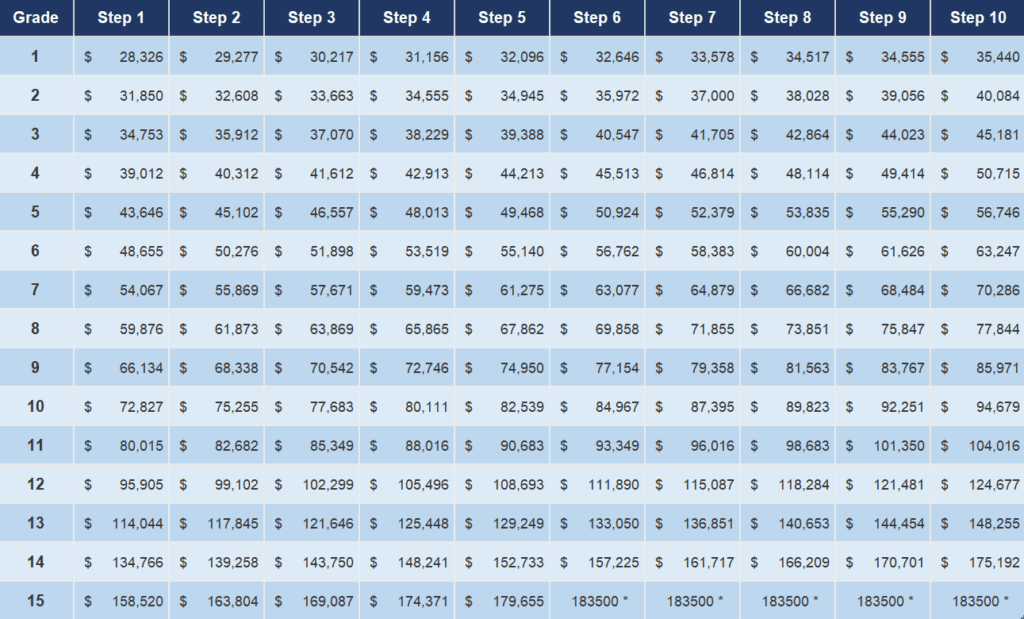Decoding the GS Pay Scale: Time Between Steps

Navigating the intricacies of federal employment often involves deciphering a unique language of acronyms and regulations. One key aspect for those working within the General Schedule (GS) pay system is understanding the time it takes to progress between steps, also known as within-grade increases (WGIs). This progression directly impacts your earnings and overall career trajectory within the federal government.
The GS pay scale, a structured framework for compensating federal employees, is built on grades and steps. Each grade represents a specific level of responsibility and complexity, while steps within each grade reflect progressive performance and experience. The time required to advance between these steps is a common question for federal employees, and understanding this system is crucial for effective career planning.
The typical waiting period between steps is dependent on the specific step. Generally, the first three steps within a grade require one year of service each. The next three steps (4-6) typically take two years each, and the final three (7-9, and sometimes 10) require three years each. However, high-quality performance can sometimes accelerate this timeline, allowing for faster progression through the steps.
Historically, the GS pay scale was established to provide a standardized and fair compensation system across various federal agencies. This structure aimed to minimize pay disparities and create a more equitable work environment. The step system, in particular, is designed to incentivize performance and reward employees for continued service and contributions. It's a cornerstone of the federal government's approach to employee retention and motivation.
One of the main issues regarding the time between GS pay steps is the potential for stagnation. If performance evaluations are consistently satisfactory but not exceptional, employees may find themselves progressing at the standard pace, which can feel slow, especially in the later steps. This can sometimes lead to decreased morale or, in certain situations, employees seeking opportunities outside the federal government.
A within-grade increase (WGI) represents an advancement to the next step within a particular GS grade. For instance, an employee at GS-9, Step 5, would move to GS-9, Step 6 after meeting the required time-in-grade and performance standards. This translates to a higher salary within the same grade.
Understanding how progression between steps works is beneficial for several reasons. First, it allows for accurate financial planning. Knowing when to expect salary increases allows for better budgeting and long-term financial goals. Second, it provides a clear framework for career progression. Employees can visualize their potential earnings growth and plan accordingly. Finally, understanding the system empowers employees to engage in constructive dialogues with their supervisors about performance expectations and career development.
To clarify, while there's no guaranteed method to accelerate progression between steps outside of superior performance, staying informed about agency-specific policies and engaging in regular performance discussions with supervisors can help optimize your growth within the GS system.
Frequently Asked Questions about GS pay step increases:
1. What is a within-grade increase? (Answered above)
2. How is my performance evaluated for a step increase? Answer: Your performance is evaluated based on your agency's performance standards and usually involves regular reviews with your supervisor.
3. Can I be denied a step increase? Answer: Yes, if your performance does not meet the required standards, a step increase can be withheld.
4. What if I disagree with my performance evaluation? Answer: You typically have the right to appeal a performance evaluation through your agency's established procedures.
5. Are step increases automatic? Answer: While progression through the first three steps is generally automatic assuming acceptable performance, subsequent step increases are tied to performance and time in grade.
6. How does a promotion affect my step? Answer: Upon promotion, your step will be determined based on the two-step promotion rule, ensuring a meaningful salary increase.
7. What happens if I transfer agencies? Answer: Your time in grade typically transfers, affecting your eligibility for step increases in the new agency.
8. Where can I find more information? Answer: The Office of Personnel Management (OPM) website provides comprehensive resources on the GS pay system.
One helpful tip is to maintain open communication with your supervisor about performance expectations and career goals. This can help clarify what constitutes "high-quality" performance within your specific agency and role.
In conclusion, understanding the timeline for GS pay step increases is fundamental to navigating a career within the federal government. While the standard waiting periods provide a general framework, individual performance and agency-specific policies can influence the actual progression. By understanding this system, engaging in proactive career planning, and maintaining open communication with supervisors, federal employees can effectively manage their career trajectories and optimize their earning potential. This knowledge empowers employees to make informed decisions, set realistic expectations, and ultimately contribute more effectively to their agencies and the public they serve. The structured progression within the GS system, while sometimes perceived as slow, offers stability and predictability, contributing to a workforce dedicated to public service.
Owens corning wall panels transforming your space
The resurgence of the female knight narrative
Salem oregon restaurant jobs craigslist your path to culinary employment







